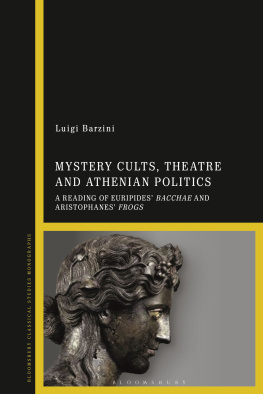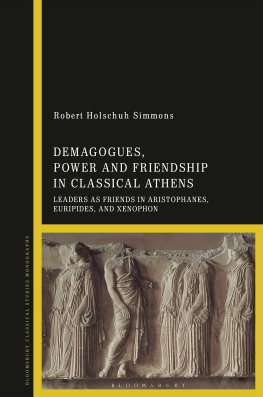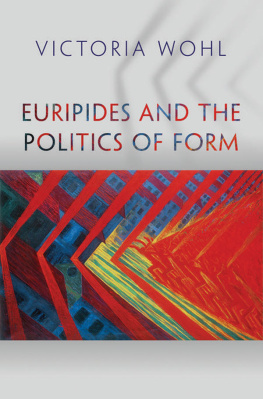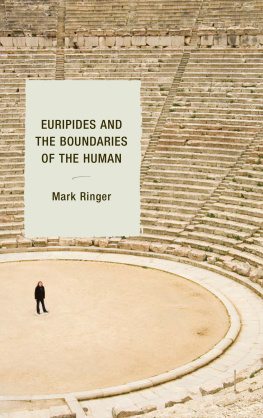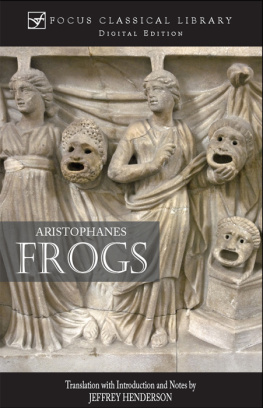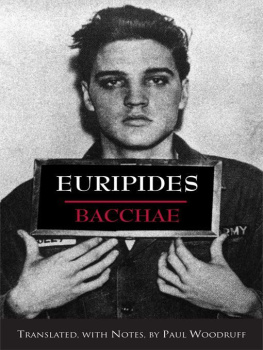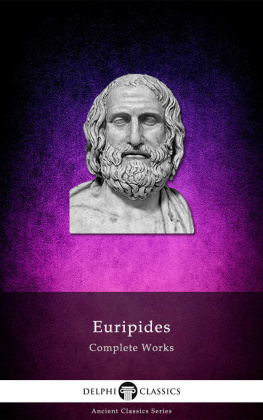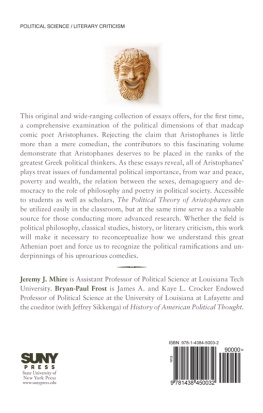
Mystery Cults, Theatre and
Athenian Politics
Also available from Bloomsbury
Behind the Mask, Angela M. Heap
Parody, Politics and the Populace in Greek Old Comedy, Donald Sells
The Materialities of Greek Tragedy, edited by Mario Tel and Melissa Mueller
The Politics of Youth in Greek Tragedy, Matthew Shipton
This book is dedicated to my patient wife Paula and to the memory of Constantinos Gouzelis

, ,
knowing that in religious matters the polis would be incensed if any man should be shown to be violating the mysteries, and that in other matters if any man should dare to attempt the overthrow of the democratic constitution
Isocrates De Bigis 6.
Contents
This book started its life as a PhD dissertation at the University of Exeter, presented in July 2019. Richard Seaford and Lynette Mitchell have been extraordinarily patient, perceptive and thorough in assisting me in transforming an initial intuition into a book.
Map of Attica
In Euripides Bacchae and Aristophanes Frogs the themes which relate to mystery cults are intertwined with a similar ethical and political message. Despite the distinctive political positions, artistic personalities and different theatrical genres of the two authors, the two plays show significant similarities: the period in which they were composed and produced, the figure of the god Dionysus as protagonist and architect of the religious and political action and the central role of the thiasos/chorus that is at the same time ritualistic and theatrical. The first prize awarded to Frogs at the Lenaea festival in 405 and to Euripides Bacchae, part of a trilogy (along with Iphigeneia at Aulis and Alcmaeon), is evidence of the popularity of these plays, not only because of their aesthetic merits, but also because of the relevance of their religious, moral and political content. The similarities between the plays, unique in extant tragedies and comedies, suggest that Euripides and Aristophanes reacted to a critical moment for the polis of Athens and shared a similar religious, ethical and political purpose, that of encouraging the reconciliation of the political tensions in Athens through the adherence to the values and rituals of Eleusinian and Dionysiac mystery cults.
The first part of this book is dedicated to the context of the plays. How did Athenian mystery cults compare with other pre-modern initiation rituals? What did initiation to the mysteries mean to fifth century Athenians? How influential were mystery cults in the development of political thought and political life in the polis of Athens? What was the emotional impact of theatre performances on the audiences? The second part is dedicated at analysing the religious and political content of the plays.
All dates refer to BC dates unless specified otherwise.
All translations are mine, unless otherwise noted. For the translation of passages in Bacchae and Frogs I have followed Seaford 1996 and Sommerstein 1997, with some amendments.
Transliteration of Greek terms and the rendition of the titles of ancient works is a notoriously disputed matter and seems to be largely a matter of personal choice. To make it consistent, I have adhered to the transliteration used by the OCD third edition, when available.
For ease of reference, I set out below the definition of some of the essential Greek and English terms related to mystery cults and the concept of polis.
Dionysus/Bacchus/Iacchus: this Greek deity had various appellations, of which these are the most frequent.
Ecstasy (), literally standing outside. Displacement, movement outwards, distraction of mind, from terror, astonishment, anger, entrancement, astonishment, trance (LSJ).
Initiand/initiate in the mysteries is the mystes (). See mysteries below.
Initiation (), from (accomplish, finish), originally meant accomplishment, performance. The term is characteristically used to denote initiation in the mysteries, and in plural to mystic rites practised at initiation, such as the festival accompanied by mystic rites. This term covers a wide semantic field. Meanings include initiation in the mysteries but also accomplishment, fulfilment, perfection and completion, terms that express the spiritual weight that mystery initiation had for the Greeks in terms of the spiritual state of the individual.
Mystery (), a secret religious ritual through which only the initiands became initiated. Chiefly in plural. From myo (): to close ones eyes, to close ones mouth, to initiate somebody into the mysteries, to be initiated.
Polis (), originally the fortified space of a citys sanctuary above the city, its heart. Hence, a religious and political community or body of citizens (opp. , their dwellings), state or community, free state, republic.
Thiasos (), a group of worshippers of a divinity. A feature of Demetrian and Dionysiac cults.
Euripides Bacchae recounts the arrival at Thebes of Dionysus and his thiasos, a sacred band of Asian Bacchic women revellers, the maenads. Upon his entry on stage, Dionysus declares he has come in human disguise to Thebes, the polis where his mother Semele, daughter of Cadmus founder of the city, had been killed by her lover Zeus lightning after giving birth to him. Having made the cities in Asia recognize his divinity and establish the rituals of his ecstatic cult, that is music making, singing and dancing in his honour, Thebes is the first Greek polis which he visits for the same purpose.
As the women of the royal family, the gods aunts, claim that a man and not Zeus was Dionysus father, Dionysus had driven them and all the women of Thebes to perform his rituals on Mount Cithaeron. The tyrant of Thebes, young Pentheus, rejects the cult of Dionysus, and does not listen to the words of caution of his grandfather, Cadmus, and of Cadmus old friend, Tiresias, both of whom join the revellers on Mount Cithaeron. He instead threatens to incarcerate Tiresias and has Dionysus imprisoned, who allows himself to be put in chains with a laugh. Despite a dialogue with the god, Pentheus pursues a war against the cult and chains the god up in the royal stables. Dionysus frees himself, makes the royal palace collapse, defeats Pentheus and joins his thiasos in front of the ruins of the palace. There he is joined by Pentheus and by a messenger who reports on the supernatural activities of the maenads on Mount Cithaeron. Pentheus is enraged and assembles his army to move against the maenads. Pushed by his prurient curiosity to watch the maenads rituals, he is however convinced by Dionysus to disguise himself as a maenad and to follow the god to Mount Cithaeron. On the mountain, the tyrant is torn apart by the maenads led by his mother Agave, who returns to the royal palace holding Pentheus head thinking it is the head of a wild beast, until her father, Cadmus, makes her see sense. Dionysus then appears in his divine nature, announces the establishment of his rituals in Thebes and sends Cadmus, his wife and daughters into exile.
Aristophanes Frogs tells the tale of the god Dionysus who wishes to go to Hades together with his slave Xanthias to make Euripides come back to Athens to revive the art of tragedy. After receiving instructions from Heracles, Dionysus crosses the Acherusian lake and encounters a chorus of frogs that sings a comical hymn to Dionysus and Apollo. In Hades, the pair meets a chorus of mystery initiates who invoke Iacchus (the Eleusinian version of Dionysus) to join their dancing procession to the meadows of Demeter. In the parodos, the chorus then proceeds to pronounce a condemnation and exclusion of the impure Athenians who have not been initiated into the Bacchic mysteries, who kindle civic strife, are guilty of treason or do not finance theatre productions from its sacred dances and from the Dionysiac festival. The exclusion on religious and political grounds is transparently aimed at the new class of Athenian rulers, unpatriotic, irreligious and unartistic traitors. The parabasis follows some comical episodes and is a direct political appeal to the audience and to the polis of Athens. It is a curiously pro-oligarchic and at the same time a radically egalitarian manifesto, opposed to the democratic leaders of the demos, but also a defence of the well-born and well-educated class of citizens. The second part of the play contains a competition, an
Next page
